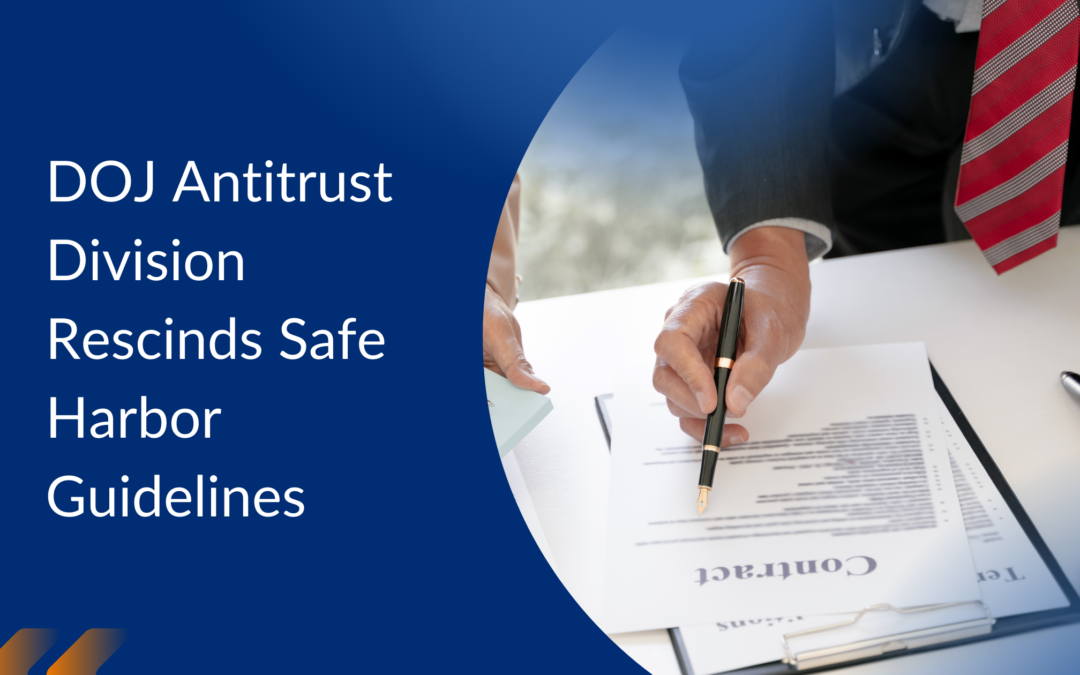On February 3, 2023 the DOJ Antitrust Division rescinded safe harbor guidelines specifying under which circumstances companies can share price and wage information. These guidelines form the basis for all compensation benchmarking surveys. These policy statements were written between 1993 and 2011, and mainly related to antitrust enforcement in the healthcare industry. Learn more about these guidelines and the implications for salary survey providers below.
According to the DOJ these policy statements are “outdated” and “lax on certain subjects, especially when it comes to the competitors sharing their price and wage info.” As of right now there is no plan to replace the previous policy statements, and instead will act on a case by case basis. This most notably will affect the healthcare industry with the elimination of the 1996 Statements of Antitrust Enforcement Policy in Health Care, the Statements of Antitrust Enforcement Policy in Health Care (justice.gov), and the Statements of Antitrust Enforcement Policy in Health Care (justice.gov). The previous antitrust safety zone that was established for exchanges in price and cost information among healthcare providers allowed businesses to trade and obtain this information, via survey, without interference from the DOJ.
Under this antitrust guideline competing healthcare providers were allowed to participate in surveys about healthcare services, prices, and employee compensation if the surveys met a certain criteria, which included the following: The survey was conducted by a third party, all data collected was at least 3 months old, a minimum of five healthcare companies provided the data, a single provider did not make up 25% or more of the data, and all providers were kept anonymous. By rescinding this policy businesses are now trying to understand how they can obtain price and compensation data in order to compete in their market.
Although the 1996 policy is directed toward the healthcare industry, it has overlap with many others like the Antitrust Guidance for Human Resource Professionals. This guideline cites the 1996 health care enforcement within its policy on the traffic of wage and employee benefit information; which has left lines blurred for HR professionals as well. Citing the healthcare industry guidelines within the HR guidelines has been a topic of discussion in Washington. An effort was made by President Biden in 2021 to make changes to the HR policy by cutting ties with the statements that reflect the healthcare policy in order “®o better protect workers from wage collusion.” Changes to the HR policy may be underway, but there are no specifications as to when this will be revised.
The DOJ’s main reasoning for making these changes is to protect businesses from sharing their future plans with competitors, but they see no issue with sharing historical or anonymous data rather than individualized data. With these new revisions, the sharing of survey data will be deemed unlawful on a case by case basis with proof that the data shared brings harm to the competition.
With the changes in place many companies are wondering how it will affect their ability to square up with their competition, price products and services competitively, and pay their employees a competitive wage. The truth of the matter is, that with the new case by case policy, and no written revisions in place of the safe harbor guidelines in healthcare, there will be ambiguity going forward for all companies who provide or obtain competitive survey data.
Greenwich.HR remains your source of real-time, company-provided pay data. Real-time pay data is at your fingertips with our labor market intelligence platform WageScape. In fact, WageScape is the only source of pay intelligence that’s forward-looking, so you see where pay is going – not just where it’s been. Want to learn more? Get in touch today!


Recent Comments